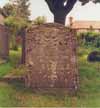
Autobiography
Noel wrote three autobiographical works. However, concerned by the degree of exposure necessitated by autobiographical writings, she decided to provide a "thin sheild of anonymity" by using pseudonyms rather than real names. Thus, the Streatfeild family became the Strangeways, and Noel called herself Victoria.
A Vicarage Family (1963)
A Vicarage Family tells the story of "Victoria's" childhood, through to the beginning of the First Word War.
Having decided to avoid real names, Noel also took a number of liberties with details, adjusting dates, distorting some characters, and rearranging or altering events to suit her story. Thus, Noel's biographer, Angela Bull, says that A Vicarage Family - in spite of its subtitle A story of myself - "is more a novel based on Noel's childhood than the unvarnished truth of conventional autobiographies" (1984:219).
Away From the Vicarage (1965. Published in the US as On Tour: An Autobiographical Novel of the Twenties)
Away From the Vicarage picks up the story of "Victoria" at the end of the First World War. It tells of her decision to become an actress, her training at the Royal Academy, and her ten years working in the field. The book ends with Vicky deciding to give up acting and become a writer.
This book is, for the most part, more factually correct than A Vicarage Family. Even the names are closer - Victoria's stage name is "Victoria Sonning", while Noel's was "Noelle Sonning" - although she does avoid naming a number of theatre luminaries with whom she worked. The fictional episodes in this book are mainly about love affairs: Angela Bull says that none of Noel's friends were able to guess the identities of "Robert" and "Claude". Bull speculates that Noel may have invented these episodes in order to conceal her "sexual coldness" (1984:227).
Beyond the Vicarage (1971)
In Beyond the Vicarage "Vicky" begins her writing career as a novelist for adults, and is persuaded (somewhat against her will) to also write children's books. Beyond the Vicarage also covers the years of the Second World War, during which Noel worked for the WVS.
As she embarks on the story of her life as a writer, Noel is forced to virtually abandon the "shield of anonymity" - many people, such as Mabel Carey, are now given their real names rather than pseudonyms. However, this book is less well structured than the two earlier works.
Once she is a writer, Vicky seems too close to Noel to be observed with the clarity of the earlier books; and the nearer the narrative approaches its actual time, the scrappier it grows. ... [After the war], Beyond the Vicarage degenerates into the random chit-chat of a letter home, with disjointed thoughts and events pulled loosely together. Fiction is avoided, but its absence demonstrates how much the other two volumes gained in shape and content when Noel's imagination took control. (Bull, 1984:229).
Nevertheless, Beyond the Vicarage provides a fascinating insight into the early years of Noel's writing career.
Biography
In addition to her fictionalised autobiographies, Noel also wrote three biographical works: a life and critical analysis of the children's author E. Nesbit, a life of Queen Victoria, and the story of a family servant, Noel's father's nurse. (She also wrote a book about Tutankhamen, but as this contains general information about the society, and about the archaeologists, I have included it in the Non-Fiction section of this website.)
Magic and the Magician: E. Nesbit and Her Children's Books (1958)
Magic and the Magician is generally described as a "biography" of E. Nesbit. In fact, more than half the book is devoted to a study of Nesbit's characters, and the biographical material concentrates almost exclusively on her childhood. Noel herself says that the book "is not intended to be a life of E. Nesbit, but an attempt only to understand her magic, and from what it sprang" (Magic and the Magician, 1958:15).
Queen Victoria (1958)
Queen Victoria was written for the US market, as part of the "Landmark" series of books, which also included such titles as Trappers and Traders of the Far West by James Daugherty, Genghis Khan and the Mongol Horde by Harold Lamb, and Exploring the Himalaya by William O. Douglas.
Noel's book is a very readable tale of Queen Victoria's life, including the political situation, her childhood and education, and her reign. Noel drew on a number of primary sources, including Victoria's diary.
Gran-Nannie (1976)
Gran-Nannie is Noel's loving tribute to Grand-Nannie, the nurse who had looked after Streatfeild children for three generations. Noel uses some of the same names as she had in the Vicarage Family series, such as Isobel, Victoria and Louise for herself and her sisters. However, it is clear that, once again, she has adjusted things where necessary to make a better story. It is, in fact, impossible to make Gran-Nannie chronologically consistent with A Vicarage Family. In Gran-Nannie, Emily - Gran-Nannie - is born in the 1870s, only about 20 years before Noel herself: in reality, she was probably born in the 1850s or earlier. The characters representing Noel's parents get married in 1910, and their daughters - Noel and her sisters - visit Gran-Nanny as children during the First World War.
It is therefore difficult to trust Gran-Nannie as an historical record of an earlier generation of the Streatfeild family or of Grand-Nannie herself. As it is is impossible to determine where truth ends and fiction begins, it should probably be viewed more as a story based on fact, than as an actual biography. Nevertheless, Gran-Nannie is an engaging tale of a young girl becoming a trusted family retainer. While many of the details may be fictional, it is an enjoyable, and (one presumes) accurate general picture of life in a big house at the end of the nineteenth and beginning of the twentieth century.
